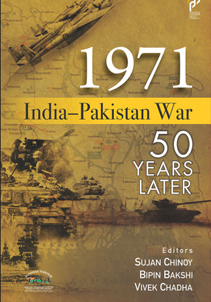1971 India-Pakistan War: 50 Years Later
- Publisher: Pentagon Press
The combined impact created by the resolute people of Bangladesh and the professional approach of the Indian state, successfully converted a catastrophe of epic proportions into a victory of the people, won through their stoic resolve and the professionalism of the armed forces.
There have been a number of books, memoirs and articles over the years that have documented first-person and academic accounts of events that marked this period of history. Not surprisingly, most were written during the period succeeding the war and after the birth of Bangladesh. This book is an attempt to evaluate events with the benefit of a five-decade time lapse. In doing so, the focus remains firmly on the military aspects of the war, accompanied by a brief account of political events, diplomacy, influence of major powers, public perception and the role of Mukti Bahini.
- ISBN:9789390095698 ,
- Price: ? 1495
- E-copy available






